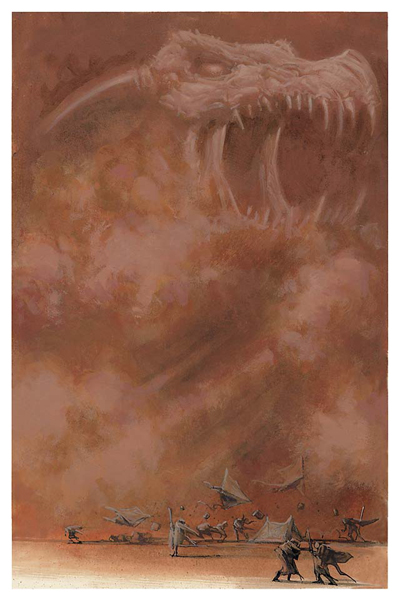Weather
Summoning
(Conjuration/Summoning)

Weather
Summoning
(Conjuration/Summoning)

|
|
|
|
|
|
|
|
|
|
|
|
|
|
|
|
|
|
|
|
|
|
|
|
Effect: The druidic weather summoning spell is similar to the control weather spell (q.v.) of clerical nature.
By casting the spell, the
druid calls forth weather commensurate with the climate and season of the
area he or she is in at the time. Thus, in spring a tornado, thunderstorm,cold,
sleet storm, or hot weather could be summoned.
In summer a torrential rain,
heat wave, hail storm, etc. can be called for.
In autumn, hot or cold weather,
fog, sleet, etc. could be summoned.
Winter allows great cold,
blizzard, or thaw conditions to be summoned.
Hurricane-force winds can
be summoned near coastal regions in the late winter or early spring.
The summoned weather is
not under the control of the druid.
It might last but a single
turn in the case of a tornado, or for hours or even days in other cases.
The area of effect likewise
varies from about 1 square mile to 100 or more square miles.
Note that several druids
can act in concert to greatly affect weather,
controlling winds and/or
working jointly to summon very extreme weather conditions.
Within 4 turns after the
spell is cast, the trend of the weather to come will be apparent, i.e.,
clearing skies, gusts of warm or hot air, a chill breeze, overcast skies,
etc.
Summoned weather will arrive
6 to 17 turns (d12 + 5) after the spell is CAST.
Anything less than greater
mistletoe as the material component will sharply curtail the weather extremes
desired.
WSG: As indicated
by the spell description, the
duration and area of effect
of the magically created weather are
dictated by the nature of
the conditions called for by the caster.
Based on general knowledge
and the information in the spell description,
the caster should not attempt
to summon any weather
condition that could not
conceivably occur during the current
time of year; if he does,
the Dungeon Master is entitled to disallow
the request and consider
the spell ruined. Weather conditions
that prevailed before the
spell was cast will resume when the duration
expires. The “trend of the
weather to come” will be apparent
to any character who observes
the changing conditions, not
just to a character with
proficiency in weather sense.